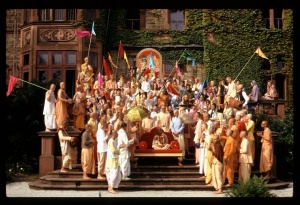SB 10.13.52

A.C. Bhaktivedanta Swami Prabhupada
TEXT 52
aṇimādyair mahimabhir
ajādyābhir vibhūtibhiḥ
catur-viṁśatibhis tattvaiḥ
parītā mahad-ādibhiḥ
SYNONYMS
aṇimā-ādyaiḥ—headed by aṇimā; mahimabhiḥ—by opulences; ajā-ādyābhiḥ—headed by Ajā; vibhūtibhiḥ—by potencies; catuḥ-viṁśatibhiḥ—twenty-four in number; tattvaiḥ—by elements for the creation of the material world; parītāḥ—(all the viṣṇu-mūrtis) were surrounded; mahat-ādibhiḥ—headed by the mahat-tattva.
TRANSLATION
All the viṣṇu-mūrtis were surrounded by the opulences, headed by aṇimā-siddhi; by the mystic potencies, headed by Ajā; and by the twenty-four elements for the creation of the material world, headed by the mahat-tattva.
PURPORT
In this verse the word mahimabhiḥ means aiśvarya, or opulence. The Supreme Personality of Godhead can do whatever He likes. That is His aiśvarya. No one can command Him, but He can command everyone. Sad-aiśvarya-pūrṇam. The Lord is full in six opulences. The yoga-siddhis, the perfections of yoga, such as the ability to become smaller than the smallest (aṇimā-siddhi) or bigger than the biggest (mahimā-siddhi), are present in Lord Viṣṇu. Sad-aiśvaryaiḥ pūrṇo ya iha bhagavān (CC Adi 1.3). The word ajā means māyā, or mystic power. Everything mysterious is in full existence in Viṣṇu.
The twenty-four elements mentioned are the five working senses (pañca-karmendriya), the five senses for obtaining knowledge (pañca-jñānendriya), the five gross material elements (pañca-mahābhūta), the five sense objects (pañca-tanmātra), the mind (manas), the false ego (ahaṅkāra), the mahat-tattva, and material nature (prakṛti). All twenty-four of these elements are employed for the manifestation of this material world. The mahat-tattva is divided into different subtle categories, but originally it is called the mahat-tattva.